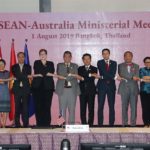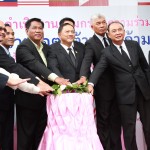
Thailand is taking the lead in lobbying the countries of the Association of Southeast Asian Nations (ASEAN) to adopt common labor standards and practices when they launch their free-trade zone, the ASEAN Economic Community (AEC), at the end of 2015, according to labor rights groups and organizers who met with Thai officials.
The move came as a surprise to some labor groups because Thailand has been under fire internationally for alleged abuses against migrant workers and supposedly failing to take serious actions to stop human trafficking. While acknowledging that problems do exist, the Thai government disputes the allegations, and has issued reports detailing steps it has been taking to address these and other issues related to labor rights and protections, and its fight against trafficking
Christopher Ng, regional secretary of Uni Asia & Pacific, a federation of labor unions in the region, told Interaskyon, a newspaper in the Philippines, that he had attended a regional meeting in Bangkok in December, at the invitation of the Thai government, which had also invited leaders of other workers’ groups as well as academics, and human rights and labor officials from the region. The purpose of the meeting was to jump-start the process of creating common labor standards.
“Thailand hosted a regional consultation for a law reform for the protection of (ASEAN) workers. The contents of the proposed law include acceptable standards – core labor standards specified by ILO (International Labor Organization) – and mechanisms and (the creation of a) commission at the ASEAN level,” he told the newspaper.
Members of the ASEAN Inter-governmental Council on Human Rights (AICHR) and of the human rights bodies of ASEAN member-countries were also invited and attended.
The AEC will remove barriers to the movement of labor – as well as capital, goods and services – and allow the free flow of workers across the region. Some labor rights groups and other analysts have raised concerns that this movement could lead to abuses, especially as labor standards, rights and practices can vary widely in different countries in the region.
By seeking to create common standards, Thailand is taking a pro-active approach and trying to stop abuses before they happen, while creating a fair and level playing field across the ten countries of ASEAN. ASEAN groups together Brunei, Cambodia, Indonesia, Laos, Malaysia, Myanmar, Philippines, Singapore, Thailand, and Vietnam.
“I was a little bit shocked when I heard about [Thailand’s] plan. When I asked them why (they wanted this), they said it was to level the playing field,” Ng said. He added that he was skeptical and thought it would be a one-time event, but now has more confidence because a second meeting has been scheduled for February 16, and the plan is to present a draft to the ASEAN Summit in April.
“I have no illusions that the plan would be perfect, but even if workers get the minimum of protection, it would be better than nothing. This would be hard work, but it is a worthwhile venture,” Ng said. “Without a social dimension, the AEC is nothing,” he added.




